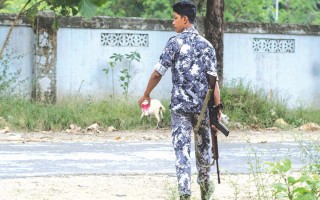Nine police officers were killed during coordinated ambushes in Myanmar’s strife-torn Rakhine state on Sunday with authorities saying the attackers hailed from the Muslim Rohingya community, a persecuted minority.
The night time raids hit three posts on the border with Bangladesh and have sent tensions soaring in a region battered by sectarian clashes between Buddhists and Muslim Rohingyas.
Rakhine has been effectively split on religious grounds since bouts of communal violence tore through the state in 2012, killing scores and forcing tens of thousands to flee.
The Muslim Rohingya are largely confined to camps and face restrictions which rights groups have likened to apartheid.
Despite their plight, the Rohingya do not have a known militant faction fighting for them and have eschewed political violence.
But at a press conference in the capital Naypyidaw on Sunday evening, authorities said the attackers were Rohingya.
‘According to our force members who are working on this case, those who attacked and raided were shouting that they were Rohinghyas,’ police general Zaw Win told reporters.
He did not elaborate on the attackers’ motivations or whether they were from a specific group.
Nine police were killed alongside eight attackers, with two assailants captured alive, he added.
Although the attack was coordinated with lethal effect, the weapons used were rudimentary.
Police said the attackers were mainly armed with knives and ‘ginkali’, a type of homemade slingshot that fires iron bolts.
But they made off with more than 50 guns and more than 10,000 bullets from the border posts.
Tin Maung Swe, a senior official within Rakhine’s state government, said that those behind the ambushes were ‘RSO insurgents’, a reference to a group known as the Rohingya Solidarity Organisation.
The RSO was a small Rohingya militant group active in the 1980s and 1990s but has not been heard from in nearly two decades.
International Crisis Group described RSO as ‘essentially defunct as an armed organisation’.
Analysts and local leaders have previously warned that the community’s continued persecution might persuade some members to take up arms.
Several complex ethnic conflicts have been rumbling across Myanmar’s borderlands for decades.
But compared to the country’s civil war-ravaged eastern and northern border states, Rakhine has not boasted a significant rebel militia presence.
In the last few years the Arakan Army, a small Buddhist militia which wants an independent homeland in the state, has fought sporadic battles with the military.
In a statement they denied being involved in the border ambushes.
In May assailants stormed a security post at a camp for Rohingya refugees in southern Bangladesh, just across the border from Sunday’s assaults.
A Bangladeshi camp commander was shot dead and the attackers made off with weapons.
Police at the time said the Rohingya themselves could be suspects.
Bangladeshi police have also alleged that Rohingya refugees are involved in criminal activities including human trafficking.
Any rise in violence in Rakhine will be a major concern for the new civilian-led government of Aung San Suu Kyi.
She has asked former UN chief Kofi Annan to head a commission tasked with trying to heal sectarian divisions in the state.
The move was largely welcomed by Rohingya community leaders but angered Buddhist nationalists.
Anti-Muslim sentiment has been fanned by hardline Buddhist nationalists who revile the Rohingya and are viscerally opposed to any move to grant them citizenship.
They insist the roughly one-million strong group are intruders from Bangladesh, even though many can trace their ancestry in Myanmar back generations.
Source: New Age









